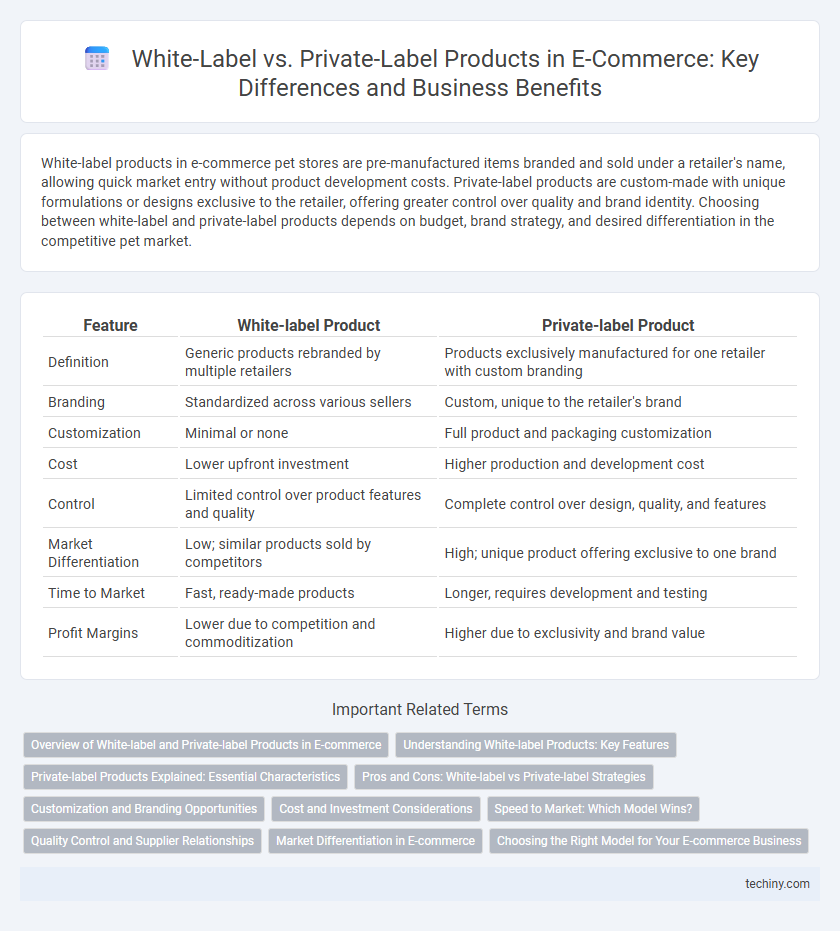White-label products in e-commerce pet stores are pre-manufactured items branded and sold under a retailer's name, allowing quick market entry without product development costs. Private-label products are custom-made with unique formulations or designs exclusive to the retailer, offering greater control over quality and brand identity. Choosing between white-label and private-label products depends on budget, brand strategy, and desired differentiation in the competitive pet market.
Table of Comparison
| Feature | White-label Product | Private-label Product |
|---|---|---|
| Definition | Generic products rebranded by multiple retailers | Products exclusively manufactured for one retailer with custom branding |
| Branding | Standardized across various sellers | Custom, unique to the retailer's brand |
| Customization | Minimal or none | Full product and packaging customization |
| Cost | Lower upfront investment | Higher production and development cost |
| Control | Limited control over product features and quality | Complete control over design, quality, and features |
| Market Differentiation | Low; similar products sold by competitors | High; unique product offering exclusive to one brand |
| Time to Market | Fast, ready-made products | Longer, requires development and testing |
| Profit Margins | Lower due to competition and commoditization | Higher due to exclusivity and brand value |
Overview of White-label and Private-label Products in E-commerce
White-label products in e-commerce are manufactured by a third party and rebranded by multiple retailers, allowing for quick market entry with minimal customization. Private-label products are exclusively created and branded for a specific retailer, offering unique control over product design, quality, and pricing. These distinctions impact brand differentiation, customer loyalty, and profit margins in e-commerce strategies.
Understanding White-label Products: Key Features
White-label products are pre-manufactured goods produced by one company and rebranded by multiple retailers for resale under their own name, enabling quick market entry without product development costs. These products typically maintain uniform specifications and quality standards, allowing businesses to customize only packaging and branding elements. Leveraging white-label products helps e-commerce businesses scale inventory efficiently while minimizing risks associated with manufacturing and product innovation.
Private-label Products Explained: Essential Characteristics
Private-label products are manufactured by third parties but sold under a retailer's brand name, enabling businesses to customize packaging, design, and specifications to align with their target market. These products offer higher profit margins and brand control compared to white-label items, which are generic products sold to multiple retailers. Key characteristics include exclusive branding rights, tailored product features, and direct influence over quality standards, allowing businesses to differentiate themselves in competitive e-commerce markets.
Pros and Cons: White-label vs Private-label Strategies
White-label products offer rapid market entry and cost efficiency by selling generic items under multiple brands but limit customization options and brand differentiation. Private-label products enable unique branding and greater control over quality, fostering customer loyalty and higher profit margins, yet require significant investment in product development and inventory management. Choosing between white-label and private-label strategies depends on balancing speed-to-market needs against brand-building priorities in e-commerce.
Customization and Branding Opportunities
White-label products offer limited customization, allowing sellers to rebrand pre-made goods with their own logo and packaging, facilitating fast market entry with modest branding control. Private-label products provide extensive customization options, enabling merchants to design product specifications, packaging, and branding elements tailored to their target audience, enhancing brand uniqueness and customer loyalty. Investing in private-label products supports building a distinctive brand identity, while white-label solutions cater to businesses seeking efficiency and quicker scalability.
Cost and Investment Considerations
White-label products typically require lower upfront investment as they involve purchasing pre-made goods that are rebranded for resale, reducing costs associated with product development and manufacturing. Private-label products demand higher initial investment due to custom product design, manufacturing negotiations, and branding, leading to greater control but increased expenses. Evaluating cost efficiency and investment capacity is essential for e-commerce businesses when choosing between scalable white-label options and differentiated private-label opportunities.
Speed to Market: Which Model Wins?
White-label products offer faster speed to market as manufacturers provide pre-made items that can be branded and sold immediately, minimizing development time. Private-label products require a longer development process, including product design and customization, which delays market entry but allows for unique branding and differentiation. E-commerce businesses seeking rapid launch favor white-label for quick scalability, while private-label suits those aiming for long-term brand identity.
Quality Control and Supplier Relationships
In e-commerce, white-label products often maintain consistent quality control as suppliers oversee production and branding, allowing retailers to quickly launch standardized items. Private-label products require deeper collaboration with manufacturers, granting retailers greater influence over quality standards and customization, which enhances brand differentiation. Strong supplier relationships are crucial in private-label strategies to ensure quality benchmarks and supply chain reliability, whereas white-label options focus on streamlined processes with pre-established suppliers.
Market Differentiation in E-commerce
White-label products offer e-commerce businesses the advantage of quick market entry with generic products that can be rebranded but often lack unique differentiation, limiting competitive edge. Private-label products enable sellers to create exclusive, customized items tailored to target customer preferences, fostering stronger brand identity and market differentiation. This strategic control over product development and branding significantly enhances customer loyalty and reduces direct competition on e-commerce platforms.
Choosing the Right Model for Your E-commerce Business
Choosing the right model between white-label and private-label products depends on your e-commerce business goals, budget, and brand control preferences. White-label products offer ready-made solutions that can be quickly rebranded with lower upfront costs, while private-label products provide full customization and exclusivity, allowing stronger brand identity and higher profit margins. Analyzing market demand, supplier capabilities, and long-term scalability is essential for optimizing product strategy and achieving sustainable growth in competitive online marketplaces.
White-label Product vs Private-label Product Infographic

 techiny.com
techiny.com